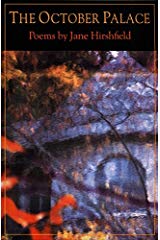Hirshfield is one of my favorite poets, and I welcomed the opportunity to reread this early (1994) collection of hers for my poetry discussion group. I’ve written before about her essays on poetry in Nine Gates. I return to these essays frequently to remind myself of what I love about poetry and what I aspire to in my writing.
The poems in this book hold mysteries that, like koans, can leave me pondering a few lines for days, such as these from the beginning of “Within This Tree”:
Within this tree
another tree
inhabits the same body . . .
Or this from the beginning of “Floor”:
The nails, once inset, rise to the surface –
or, more truly perhaps, over the years
the boards sink down to meet what holds them.
My favorite poem in the collection is “Autumn” which so brilliantly evokes this particular moment in time, as the wind sweeps through the trees here, taking our glorious season into its next phase. Here is the poem in its entirety:
Again the wind
flakes gold-leaf from the trees
and the painting darkens –
as if a thousand penitents
kissed an icon
till it thinned
back to bare wood,
without diminishment.
Think about these images for a moment: flaking gold-leaf such a perfect description of yellow leaf-fall, an icon thinned by kisses for the tree’s gradual disrobement. Most of all, though, the bare wood—of the painting, of the tree—is not only without diminishment but is in truth the real value of each. What do we value? What do we repent of? What do we revere?
Winter-lover that I am, I adore the bare black skeletons of trees; they are a revelation, the strong bones beneath the leaves and fruit, a promise.
One thing I love about The October Palace is the section at the end titled Notes on the Poems where she gives a snippet of background on some of the poems: a dedication, a description of a proper name, a slight hint at what inspired the poem.
With some of the poems, my group floundered a bit, offering different interpretations and personal responses. To me, this openness is one of the great gifts of poetry: the leaps we readers must take, as Robert Bly said. Or as Hirshfield says in Nine Gates about storytelling in poetry:
. . . the reader as well as the writer must bring the full range of memory, intellect, and imaginative response. The best stories are almost mythlike in their ability to support alternative readings, different conclusions . . . The words of a poem are not ends, but means into an exploration without limit.
Rather than a response to the commonly asked question “What author living or dead would you like to have dinner with?”, I would most love to walk in the woods with Hirshfield or perhaps prepare a meal with her. I would ask her questions about her poems and essays. But in the end it’s the poems that matter, and I value the distance they must travel to reach me because it leaves me free to bring my own memory, intellect and imagination to them.
Have you read any of Jane Hirshfield’s poems? Is there one you particularly like?
